
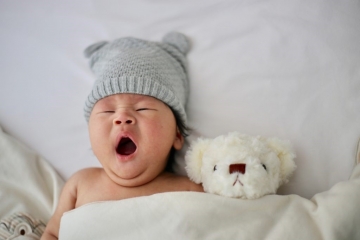 7 Sleep Tips To Improve Your Baby's Sleep Quality
7 Sleep Tips To Improve Your Baby's Sleep Quality 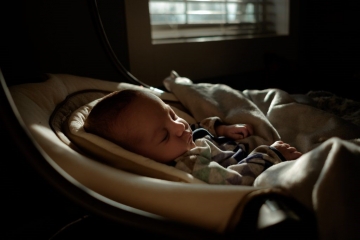 The Importance of Sleep for Your Baby
The Importance of Sleep for Your Baby 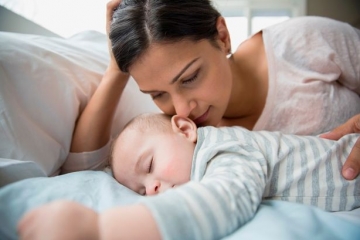 Co-Sleeping With Your Child: Pros & Cons
Co-Sleeping With Your Child: Pros & Cons 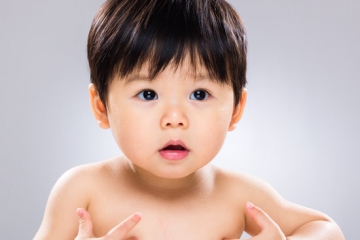 Does My Baby Have Eczema? Causes & Treatments
Does My Baby Have Eczema? Causes & Treatments 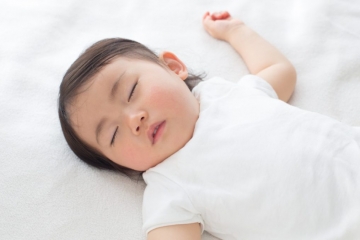 What Is Healthy Sleep For My Baby?
What Is Healthy Sleep For My Baby? 
Baby acne can occur in as high as 70% of babies including newborns. It is thus quite a common ailment. But what causes those nasty blisters and how can you treat and prevent them? Here is all you need to know about baby acne, its cause, symptoms, treatment, and prevention.
Erythema toxicum neonatorum, better known by its colloquial name baby acne, is the formation of yellow or white-headed blisters or papules surrounded by red skin on cheeks, forehead, neck and parts of the torso like the chest. They can even appear on legs, predominantly on thighs.
The red blisters of baby acne usually appear and disappear over the course of days or even hours. Although they seem nasty, they are harmless. In fact, your baby will be least bothered about that acne and will continue to behave normally.
There are two types of acne that affect babies at two different stages of their infant life:
Neonatal acne may last a month and clear away without any scarring. In some cases, it may last a couple of months and then clear away without medical intervention.
On the other hand, infantile acne could last for months but will show signs of fading once the baby turns twelve months old. However, this acne has a tendency to persist until three years of age, in which case they leave a permanent scar. Medical intervention may be required in case of infantile acne.
Baby acne usually affects parts of the face but can also be found on neck, chest and sometimes on the scalp. The symptoms include red patches or red blisters that cover a localized section or are distributed in various parts of the body.
Infantile acne looks quite similar to adolescent acne since they may also show pustules, which are pimples. This acne can be itchy, and the baby will try to scratch the affected area.
There is no known cause for baby acne, and even medical practitioners are perplexed by it. There are hypotheses though, and we have listed the popular ones. Note that these are not the confirmed reasons for baby acne but just the popular theories about probable causes:
The transfer of maternal hormones from breast milk to the baby is often considered a reason for baby acne. In case a newborn displays acne within a few hours of birth then the transfer of hormones could have happened through the placenta in the womb.
Breast milk is the safest food for a baby, even if it is laden with maternal hormones. It is never known to cause any skin problems. In fact, it improves the baby’s resistance thanks to its antibodies.
Babies have a developing epidermis, the outer layer of the skin. Their skin can be so sensitive that it is easily affected by simple events such as a change in temperature, contact with an abrasive material or even too much pressure at a point.
All babies have sensitive skin. Thus, this theory does not explain why some babies suffer from acne while some never get it.
The acne could be considered a complication of certain allergy. It could be an allergy to a food or medication. Skin hives and eczema are common manifestations of an allergic reaction. Although they may seem similar, skin hives and eczema are different from baby acne. Baby acne does not cause any discomfort to the baby nor is life-threatening. Moreover, babies that are exclusively breastfed and non-allergic may also show acne.
Continue on next page...
It has not been scientifically proven that any food consumed by the mother, like fatty or oily food, causes baby acne. Since babies do not eat the food, which adolescents suffering from acne eat, the possibility of acne being caused by an ingested food can be ruled out in the case of babies.
Thus, baby acne does not have a specific cause and can be conveniently described as a spontaneous event. Changes in skin structure due to its constant growth and development could be a reason since baby acne is less prevalent in premature babies whose skin is yet to attain the level of a full-term baby. It is a theory that is not scientifically proven and is just a speculation. As a parent, you need not worry about harmless baby acne, but there can be situations when you must rush your little one to the doctor.
Baby acne is not fatal and should not be a source of constant worrying. But there are certain situations in which you must promptly bring the condition under medical supervision:
An inspection of the acne by a doctor can help make an accurate diagnosis of the condition.
As astonishing as it may sound, there is no treatment for baby acne. The primary reason is the fact that there is no known cause for baby acne thus making it impossible to prescribe a medicine without knowing the target. Baby acne itself is completely harmless and is never dangerous. It may last for a few days or a month but will disappear without your intervention. Your pediatrician is quite likely to advise you to leave the condition untouched.
However, he might suggest some medicine to provide relief for the baby’s skin.
First a word of caution. Do not try any over-the-counter acne medication for your baby nor use a cream, lotion or soap without your doctor’s advice. Most non-prescription acne medications are for adolescents and adults. Do not even use essential oils, creams or scrub the baby’s skin during bathing.
There are certain home remedies such as oatmeal bath that aim at moisturizing the baby’s skin but have not been medically proven to treat baby acne. All these can actually worsen the condition. If there is anything you can do to help your baby’s skin to be healthy, then it is the following:
Breast milk provides the best nutrition for your baby. It is rich in powerful antibodies that protect the baby from pneumonia and diarrhea-causing pathogens. It also protects the baby from developing allergies.
Breast milk also has antibacterial properties due to the presence of lysozyme, an enzyme that inhibits microbial growth. You can express some milk from your breast and dab it on your baby’s acne using a piece of cotton. This should not be harmful to your baby.
Since baby acne has no specific cause and occurs spontaneously, there are no recommended preventive measures. But you can follow some general guidelines. Following are the various ways you can keep your baby’s skin soft and healthy:
Have a regular bath routine for your baby. This ensures that his skin is free of bacteria and dead cells. It will also help control sweat since babies have underdeveloped sweat glands that tend to secrete excessively.
Your baby will happily wear what mommy buys for him. Be sure it is soft, comfortable and provides ample room for movement and ventilation. Babies can get quite vexed with tight clothing, especially during summer. This can cause serious skin conditions that may require prompt medical attention.
Replace those diapers regularly even if the junior has not soiled them. Nappy rashes are those nasty blisters that can occur just by moisture and lack of ventilation.
If it is humid summer, then keep his skin dry; if it is dry winter, then keep his skin moist. Maintaining ample levels of moisture and dryness according to the season is quite important. The underdeveloped skin is too primitive to maintain moisture on its own. Therefore, it needs external intervention through moisturizers and ventilation.
You must never scratch, pinch or poke a rash on your baby’s skin. Fiddling with it will aggravate the condition causing a major outbreak that may require medical attention.
There can be situations when the rashes on the skin are not exactly acne and are indicators of some other skin problem.
Subscribe to our mailing list and LIKE US to receive our latest updates!
Copyrighted Pregnancy & Baby by Mummys Market 2019


